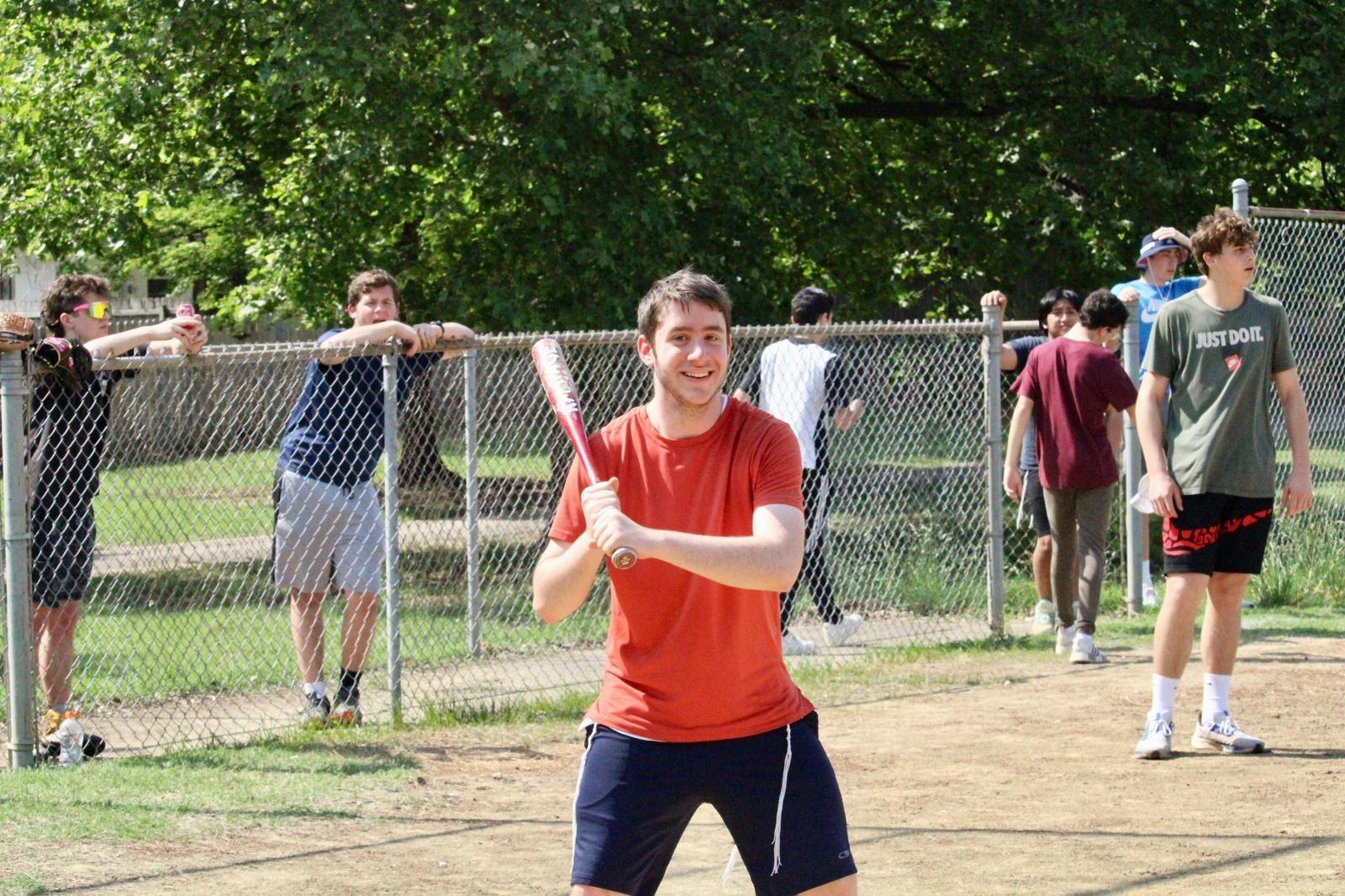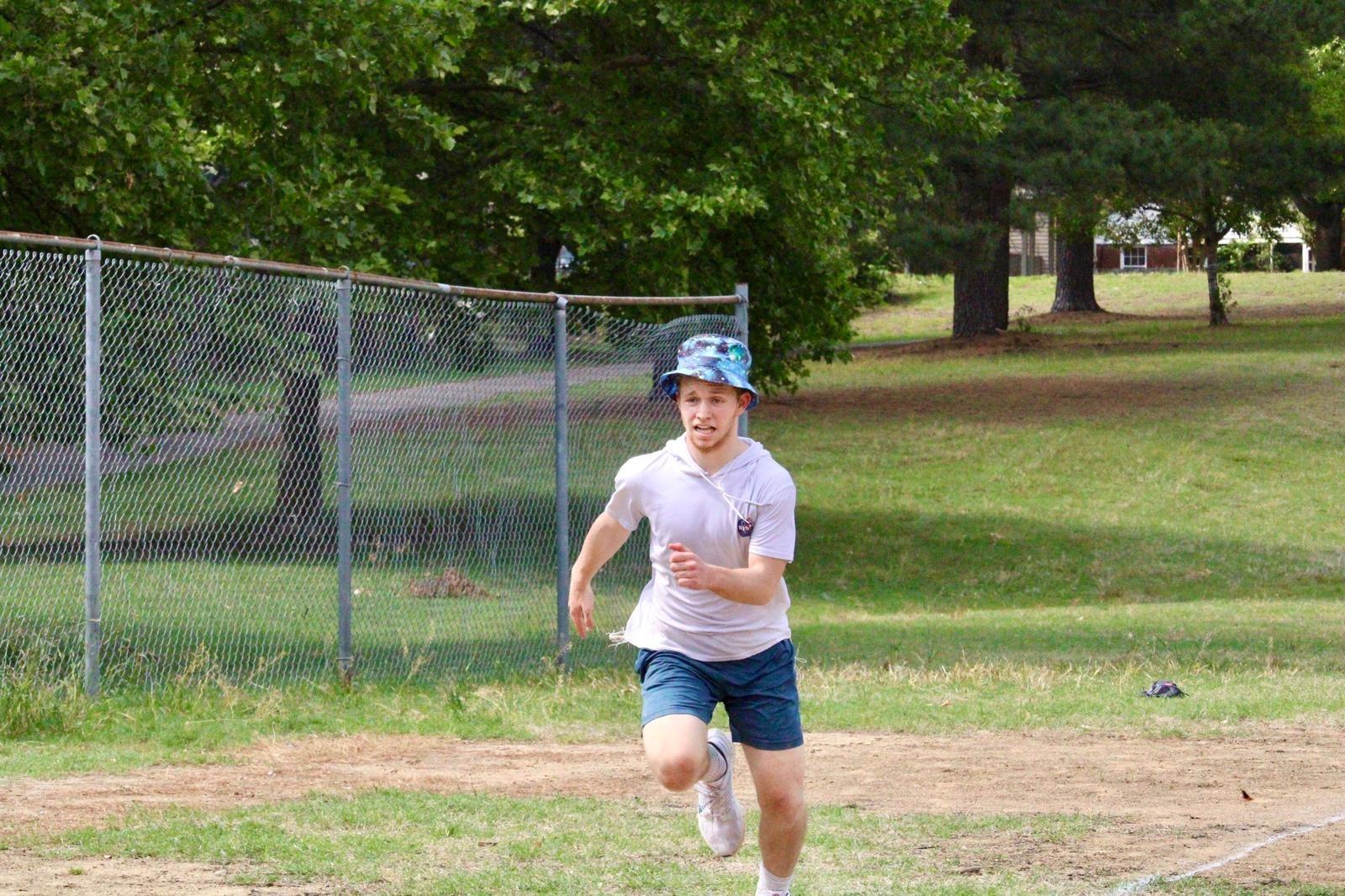CYHSB WEEKLY
Cooper Yeshiva High School for Boys
Volume 17, Issue 16
Rabbi Shimon Bar
Yochai: An Inspiration well Past his Passing
Page 3
Cooper Clicks
Page 4
Terror in Israel as Gaza Situation Escalates
Page 6
Parshas Behar
Bechokasai: Surprising Sabbatical Specifics
Page 7
This week’s Weekly is sponsored by Joshua Parcover in honor of this year’s weekly staff.
Many AP classes are given every year at our school, but are they helpful or hurtful for students? Source: collegeboard.com
AP Classes: Ideal or Ordeal for Students?

Yaron Weiss (24’) With colleges being harder to get into and the academic field being more complicated students are always trying to figure out ways to stand out. One such way is AP classes. But, one may ask, what exactly is an AP class? AP stands for Advanced Placement and is a program run by the College Board, an organization that helps students get access to colleges and different opportunities. Apart from AP classes they also administer the SATs and the ACTs with a practical monopoly on both college level tests and tests with cool sounding acronyms. College
Board offers a total of 38 AP classes ranging from subjects like math and science to social science and world languages, which are all taught at a college level. Schools choose which AP classes they are willing to offer each year.At the end of the year students in AP classes take a test, which normally consists of two parts, free response questions (FRQs) and multiple choice questions (MCQs). But then the next logical question is, how does this help a student? How does taking an AP class help a student get into a college or make them look better?
Volume 17, Issue 16 May 12th, 2023 CYHSB Weekly 1
Cont. from first page:
The answer to that is scoring. The scoring for an AP final is on a five point scale. A one or two is a fail, while a three, four or five is a pass. When applying to a college, administrators look at the score a student received on their AP tests. Students with a higher score impress colleges more than ones with lower scores. By looking at one's scores an administrator can determine many things about the applicant. They can see if the student is able to handle college level classes, if they are committed to learning, if they are smart, and how passionate they are about a subject.
The score one receives on an AP final can also affect how many years they have to go to college for or allow them to take more college classes than a normal student wouldn't have the time or opportunity to take. This is due to the five point grading scale. Some colleges accept the score on your AP final as credits for the subject. So if a student received a four on their AP science final, a college might accept them with four science credits. However not all schools accept all scores; most schools only accept scores of three or higher. One score can also have an effect on tuition fees. Students who receive high scores in AP classes are more likely to receive scholarships than students who score low or don’t take an AP all together.
One more reason for taking AP classes is the boost it gives to your GPA. In most schools, including ours, an AP class counts as six points for a student’s GPA, or grade point average. This means that a B in an AP class is worth the same as
AP exams can be stressful but rewarding experiences for students. Source: thehawkeye.com
an A in an honors class and an A in an AP class is one above an A in an honors class. Colleges also look at a student’s GPA to accept people over each other and give out scholarships leading to much of the same benefits as before. This also may help with winning valedictorian, which is mostly based on the student’s GPA.

Another good reason to take an AP is for the experience. As stated, an AP class is taught at a college level. This gives students the opportunity to prepare and see what it is like to take a college class. It helps students with time management and can also enhance a student's critical thinking and problem solving skills. Junior Joshua Parcover said about AP’s, “AP classes are a part of our curriculum which I find very valuable as it gives me very good
experience for classes at college level..”
While all of these reasons make APs seem like a good idea to take they are not always for everyone. AP classes require a lot of time and effort to get a good grade. Students who are not able to keep up will get left behind. On top of that there is a risk and reward. To take the test at the end of the year students must register and pay a fee. Students who are not prepared for the test can end up failing and in a sense wasting their money. Over the last week and a half at the CYHSB students have been taking these exams I’ve been talking about. The AP classes that were available this year were AP Literature, AP Environmental Science, AP Art History, and AP Calculus. . Next year the AP classes that the CYHSB will be having are AP Calculus, AP Psychology, AP US History, and AP Language.
Volume 17, Issue 16 May 12, 2023
Weekly 2
CYHSB
Make sure to check out and follow our brand new CYHSB account @cooperyeshiva on instagram!
Rabbi Shimon Bar Yochai: An Inspiration Well Past His Passing
Avi Becker (’24)
This week we celebrated Lag Baomer which partly commemorates the Yahrtzeit of Rabbi Shimon Bar Yochai. When Rabbi Shimon was a young boy, he studied in the great academy of the scholars of Yavneh which was founded by Rabbi Yochanan ben Zakkai, who died just about the time that Shimon was born. Shimon’s principal teacher was the famous Rabbi Akiva, who had his academy in Bnei Berak.

During the persecution by the Roman Emperor Hadrian, when academies were shut down and learning was punishable by death, Rabbi Akiva continued to teach the Gemara publicly, and his Shimon stayed at his side until Rabbi Akiva was arrested. However, even then, Shimon continued to visit his master in prison to receive instruction there. Only death finally separated them, for Rabbi Akiva was condemned to die a martyr’s death for Kiddush Hashem (the sanctification of G-d’s name).
and water daily. When the search was intensified, they decided to seek a better hiding place. Without telling anyone of their whereabouts, they hid in a cave. G-d caused a carob tree to spring up at the entrance to the cave, as well as a spring of fresh water. For twelve years, Rabbi
twelve months, and left it again, only after they heard the same heavenly voice calling them to leave.
This time, they came out with a different outlook on life. Seeing a Jew carrying two bunches of myrtle, rushing home on Friday afternoon, they asked him what he was going to do with the myrtle.
“It is to adorn my house in honor of the Shabbat,” the man replied. “Would not one bunch of myrtle be sufficient to fill your house with fragrance?” they asked. The stranger replied, “I am taking two bunches, one for ‘Remember the Shabbat day and the other for ‘Keep the Shabbat Day holy.’” Said Rabbi Shimon to his son, “See how precious the precepts are to our brethren!”
Satisfied that despite all the decrees and persecutions of the cruel Roman rulers, the Jews still clung to the commandments and especially Shabbat observance, Rabbi Shimon and his son felt greatly encouraged.
Last Week’s Solution
Finally, Hadrian died, and his decrees were no longer enforced with the same brutality as before. The leading sages of that time gathered to consider ways and means of restoring Jewish religious life. The leading sages were Rabbi Yehudah, Rabbi Yosei HaGlili, and Rabbi Shimon bar Yochai. At this meeting Rabbi Shimon preached defiance against the Roman rule in vengeance of his teacher’s brutal death. This caused much aggression towards him and he was forced to flee.
Rabbi Shimon fled for his life together with his son Rabbi Elazar. For some time they stayed in hiding in the Bet Hamedrash , where Rabbi Shimon’s wife brought them bread
Shimon bar Yochai and his son Elazar dwelt in the cave, sustaining themselves on carobs and water. During this time, they studied and prayed until they became the holiest sages of their day.
At the end of twelve years, Eliyahu came and told them of a radical change in the government that once seemed to capture them. They left the cave passing a field where they saw Jewish farmers toiling on the land and they said, “Imagine people giving up the sacred study of the Torah for worldly matters!”

No sooner did they utter these words, then all the produce of the field went up in smoke. Then they heard a heavenly voice saying, “Have you come out to destroy My world? Go back to your cave!” They returned to the cave for another
Rabbi Shimon bar Yochai is the author of the sacred Zohar (“Brilliance”), containing mystic interpretations of the Torah, and the chief source of the Kabbalah. For many generations, the teachings of the holy Zohar were studied by a few select scholars, until the great scholar Rabbi Moses ben Shem Tov de Leon published the Zohar about seven hundred years ago. Rabbi Shimon is also the author of Sifri and “Mechilta of Rabbi Shimon bar Yochai.”
Rabbi Shimon bar Yochai died in Meron, a village near Safed, in the Land of Israel. There, often times, on Lag BaOmer people visit his grave, not in mourning of the life that was lost, but rather in exuberance of the life that was.
Volume 17, Issue 16 May 12, 2023 CYHSB Weekly 3
Rashbi’s Yahrtzeit is the main reason for the celebrations on Lag Baomer. Source: jerusalempost.com
Cooper Clicks: Lag Ba'Omer Edition




There will be a different puzzle each week, so stay tuned!







Images: Top Right: Jack points to somebody in the outfield, but his attempt at a Jordan Poole game is cut short by his immediate pop-up. Top lef: Oblivious fielders search in vain for Rafi G while he sneakily makes his way to second base. Middle Lef: Amit Zalman does a funky dance down the third base line before he is easily thrown out at home. Bottom Lef: Jack Kampf pretends to catch the bal in his glove, briefly forgetting there was a real bal to catch, alowing the runners to score. Bottom Right: Nathan Baer runs so fast he accidentaly goes back in time and grows a mulet
Photos: JJ Stein

Volume 17, Issue 16 May 12, 2023 CYHSB Weekly 4
Cooper Clicks: Lag Ba'Omer Edition





Images: Top lef: Ezra Wiener contemplates beating J.J. with his bat. Top Right: Zechariah hits a basebal right in font of Natey “Gee” Greenbaum ruining his picture. Middle Right: Rafi Goldkin sprints towards a Gemara at home plate.


Bottom Right: Jacob DeGrom, I mean Avi “GOAT” Becker cals for the bal before demolishing the opposing hitters.
Bottom Lef: Nathan Greenbaum sees a particularly delectable ice cream cone and demands it be sent to him during his at bat. Photos: JJ Stein


Volume 17, Issue 16 May 12, 2023 CYHSB Weekly 5
Terror in Israel as Tenuous Gaza Situation Escalates

Akiva Levine (’26)
This past week, a horrendous series of attacks were carried out against Israel from the Gaza Strip. Israeli settlements and cities like Sderot, Ashkelon, and Ashdod were barraged with over 300 rockets. These attacks were executed this past Wednesday in only a matter of hours and luckily no casualties were reported. Israel used their Iron Dome defense missile system to deflect most of the rockets. Nonetheless, great terror sparked throughout Israel as a result of these attacks, and many people became aware of this emerging situation set within the Palestinian-Israeli conflict.
house in the border town between Gaza and Israel, of Sderot, suffered a direct hit.
During these attacks and the hostility that hung ominously in the air, several regional powers like Egypt attempted to broker a ceasefire between Gaza and Israel, as only in the past 10 months, Israel
Last Week’s Solution

The rockets this past week have been the most recent increase in hostility between Gaza and Israel. Many claim the rockets were shot in response to Israel’s killing of three top commanders in an Islamic Jihad, as part of Israel’s Shield and Arrow operation. Following Israel’s operation and successful targeted assassination, Hamas spokesperson Hazem Qassem issued a warning, claiming that Israel "bears responsibility for the repercussions of this escalation." When situations like this have occurred in the past, Israel knew how to deal with them. As the rockets were shot, millions of Israelis were instructed to remain close to safe rooms and bomb shelters. Aside from the Iron Dome, other Israeli air defenses such as David’s sling air defense system intercepted the rockets. (The David’s Sling became operational in 2017 and unlike the Iron Dome, it intercepts rockets from a medium to long range, instead of a short range. ) Thanks to defenses like these, only one empty
has already had its third confrontation with an Islamic Jihad. The political chief of Hamas, located in Gaza, claimed that he had received phone calls from Egyptian, Qatari, and United Nations officials on this matter.
A question still hangs: will Hamas, join an Islamic Jihad to continue retaliatory action against Israel? This question can determine the very length and intensity of the current round of fighting. The rockets fired were most likely being launched solely by an Islamic Jihad and no indication of Hamas’s involvement has been reported, said Daniel Hagari, an Israeli military chief spokesperson, to the New York Times.
From a political standpoint, these events can show us the different goals and interests of an.
Islamic Jihad and Hamas. The interests of Hamas differ from those of an Islamic Jihad. Over the past year, Hamas has been less eager to engage in fighting with Israel, as Israel issued over 20,000 permits for Gazans to work in Israel, slightly benefitting the people of Gaza. It is no doubt that Israel alike has no interest in the ensuing war with Gaza. Israeli spokesperson Hagari stated, to the New York Times, “Israel is not interested in war.”, continuing to explain that Israel had already achieved its objective with the killing of three Islamic Jihad operatives. Amid this crisis that caused this year to be the deadliest in more than two decades for Palestinians and Israelis, 110 Palestinians and 12 Israelis have been killed. Israeli schools near Gaza have closed and a state of emergency has been issued throughout areas of the country. Over the past years, Israel has continuously been attacked from surrounding hostile territories, yet their resilience as a small nation leaves them to be a surviving nation in the face of adversity. Israel will continuously try to defend itself as a nation and will never allow the Jewish homeland to become uprooted. As a united Jewish community in Memphis Tennessee, though we are not directly connected to Israel on a day- to day basis, we must protect and honor our homeland. We must continue advocating for our Jewish state of Israel as it defends itself against enemies.
As Benjamin Netanyahu said in March of 2012, “The purpose of the Jewish state is to secure the Jewish future. That is why Israel must always have the ability to defend itself, against any threat.”
Volume 17, Issue 16 May 12, 2023 CYHSB Weekly 6
Palestinian militants launch rocket attacks afer Israel strikes on Gaza. Source: nbcnews.com
Parshas Behar-Bechukosai: Surprising Sabbatical Specifics

Ezra Davidovics (’24)
This week’s parsha is the double parsha Behar-Bechukosai. The parsha of Behar begins with a description of the laws of shemittah. The Torah describes the shemittah as a “Shabbos La’Hashem.” This description is extremely cryptic as of course Hashem doesn’t need rest so why would there need to be a year of rest for Him?
This question is one which is asked by many of the meforshim as it is a very strong question. Rashi’s answer to this question is a pretty simple one. He says that “ la’Hashem ” here means “L’shem Hashem” or for the sake of Hashem This means that the reason why we observe the shemittah is because Hashem told us to but Hashem himself is not the one who rests but rather the people and the land are. Rashi quotes this answer from the Medrash Toras Kohanim. Rashi then proves this from the fact that it says the same thing by the weekly shabbos and it means because Hashem said so.
Last Week’s Solution
The Ramban however argues on this answer saying that the Chazal who expounded on this pasuk in the medrash couldn't have meant like Rashi says, that it means for the sake of Hashem, as all Yamim Tovim are for the sake of Hashem and nowhere does it mention that they are “shabossim La’Hashem” but rather it states they are “for you”. Ramban instead answers with a mystical concept that actually what the pasuk means is that in some way Hashem Himself rested and thus we also don’t do any work. He also says that this is what it means in the medrash when they say it is just like the first Shabbos

where Hashem himself also rested. The Ramban quotes the Ibn Ezra who also seems to be saying the same thing here.
In the next pasuk the Ramban asks another, different, question. The next pasukim state, “six years
Ramban then quotes another, final, aggadic answer to this question. This answer comes from the Mechilta in Mishpatim which quotes Rabbi Yishmael. Rabbi Yishmael there states that when Bnei Yisrael are doing the will of Hashem they will only have to observe one shemittah year every seven year cycle, however if the Jews do not fulfill the will of Hashem the land will become so infertile that in order to grow any crops the farmers will need to rest the land every other year, thus resting for four sabbatical years. Therefore, this pasuk which says to sow the land for six years, is actually a blessing for when we follow Hashem’s will we will be able to sow for six years every seven and always only have to observe one shemittah year.
the seventh year... your land will rest.” The Ramban asks here why the Torah says to work for six years if the whole point of the section is to rest on the seventh. He answers that this is just the normal way which the Torah talks, such as in the section about the weekly shabbos where it says “six days you shall work.”
The Ramban then quotes a more complicated answer which he quotes from Chazal. This statement of Chazal says that the statement, “Six years shall you sow” actually constitutes a positive commandment to go along with the negative commandment. They are saying that when the Torah states something like this in the form of “do this but don’t do this,” that if one were to violate the negative commandment it would count as if they violate both the positive and negative commands.
This Medrash shares a beautiful message for our lives. The Shemittah year and all of its laws can seem like a death sentence and a huge restriction for all of the farmers who live in the land of Israel. After all, how can they survive not farming any food for a whole year!? However the Torah reveals to us through this pasuk of “Six years shall you sow” to show us how, in fact, without this year of shemittah our land would be even more infertile and more years of rest would be needed to replenish the land. This shows us how for all mitzvos which we may not understand and we may feel are huge restrictions on us are actually of course made by Hashem who has infinitely more knowledge than us and only has our best interests in mind and therefore, of course, the mitzvah will undoubtedly help us out in the long run.
Volume 17, Issue 16 May 12, 2023 CYHSB Weekly 7
This week’s parshios discuss the idea of a sabbatical year fom farming. Source: kulanukids.org
Sponsor an Issue
A sponsorship is a great way to honor the memory of a loved one, celebrate an accomplishment, or just show appreciation to the CYHSB Weekly. We reach hundreds of people each week, helping to get your announcement out for just $20.
CYHSB Weekly Staff
Editor-in-Chief
Ezra Davidovics | ezra.davidovics@mhafyos.org
Layout Editor

Nathan Greenbaum | Nathan.greenbaum@mhafyos.org
Associate Editor-in-Chief
Nadav Lowell | nadav.lowell@mhafyos.org
Managing Editors
Ethan VanderWalde | ethan.vanderwalde@mhafyos.org
Raanan Vanderwalde | raanan.vanderwalde@mhafyos.org
Assistant Layout Editor
Amit Zalman | amit.zalman@mhafyos.org
News Editors
Joshua Parcover | joshua.parcover@mhafyos.org
Yaron Weiss | yaron.weiss@mhafyos.org
Akiva Levine | akiva.levine@mhafyos.org
Complaint Manager
J.J. Stein | jacob.stein@mhafyos.org
CYHSB Weekly Staff
Avi Becker | avi.becker@mhafyos.org
Baruch Finkleman | baruch.finkleman@mhafyos.org
Rafi Davidovics | rafael.davidovics@mhafyos.org
Benny Freiden | benjamin.freiden@mhafyos.org
Rafi Goldkin | rafael.goldkin@mhafyos.org

Jojo Ardestani | jonathan.ardestani@mhafyos.org
Yosef Vanderwalde | yosef.vanderwalde@mhafyos.org
From the Editor:
The feel of the bat in your hands, the ball hitting the back of your glove, the ball jumping off the sweet spot of the bat after your swing. There simply is no better sport than America’s favorite pastime. The only sport that leaves you itching to play as you gaze outside on a beautiful spring day. Unlike the pictures seen in the picture page, however, most of this week we were sent an unfortunate heat wave which denied us the pleasure of playing baseball most days. This teaches us the valuable lesson that sometimes what we want is not what we get.
Administrative Advisors
Rabbi Dov Rossman
Mrs. Ashley Brown
- Ezra Davidovics
Volume 17, Issue 16 May 12, 2023 CYHSB Weekly 8



































